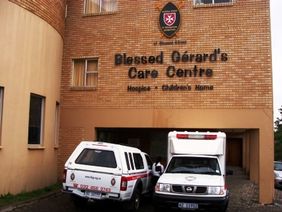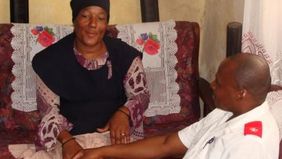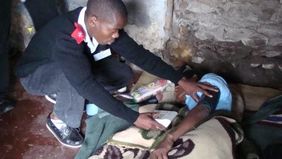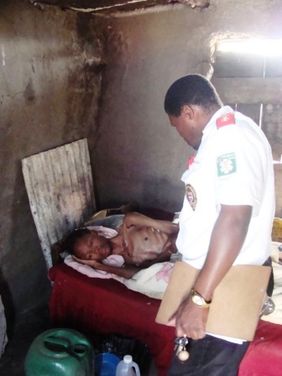It is 8:30 a.m. and the four-wheel-drive all-terrain vehicle is ready in front of the Care Centre. Today I have the opportunity to drive out with Patrick and Wiseman to their home visits for AIDS therapy accompaniment. I know both of them from previous visits and it is a nice reunion. Since regular, uninterrupted medication is a prerequisite for the success of antiretroviral therapy, but most of the patients live far away in slums and scattered settlements in Zululand and can hardly come to the Care Centre themselves, regular home visits are a prerequisite for this treatment. Several hundred AIDS patients receive antiretroviral therapy through the Brotherhood of Blessed Gerhard. After extensive training before starting the therapy, the patients have to be followed up regularly. Antiretroviral therapy is much more than just handing out tablets, as some people far away in Europe often believe. Complex counselling beforehand, extensive medical treatment and professional follow-up care through home visits are all part of this programme. This is also important because many patients often cannot read or write. The patients are destitute, live under the most adverse conditions and would not have a South African Rand to pay for the vital therapy. But without the treatment, they would very quickly reach the final stage of AIDS and have to die. With treatment, the onset of the disease can be delayed for many years to decades and during this time these people can raise their children, work and cultivate their gardens and fields and continue to live.
People who are HIV positive or already suffering from AIDS can be admitted to the therapy programme (HAART programme) under certain medical criteria. This is a medically complex decision-making mechanism for which the medical director of the Blessed Gerhard Brotherhood Centre, Dr Khaya Nzimande, is responsible, applying internationally recognised criteria.
Since only a single day of missed medication can cause a mutation of the virus and thus the end of the treatment option and the renewed outbreak of the disease, continuous care is important. Patrick and Wiseman provide this care through home visits. The two of them are on the road every day with an all-terrain vehicle to visit these people in their homes.
Departure: I sit next to Patrick on the passenger seat. We talk and have a lot to tell each other. The Brotherhood of Blessed Gerhard is not only called that in church tradition - in this common help we as helpers are also really brothers (and sisters).
We drive out of the Care Centre and turn onto the well-paved residential road, drive past the SAPPI paper mill until we reach the crossroads. The drive continues towards the township of ISithebe and far beyond. A few decades ago there was bush land here, then large factories settled, many people moved here, but later also with the result of great unemployment and poverty due to changes in industrial production methods and economic dislocation. At some point we leave the tarred roads. From here on, off-road capability of a vehicle is a prerequisite to move forward. On paths that no longer deserve the name road, we continue "over hill and dale". The vehicles of the Brotherhood of Blessed Gerhard are well known out here. We are greeted with joy by many people, small children wave to us. The Brotherhood of Blessed Gerhard is often the only help people get out here. Together with Patrick, I visit people who live partly and in the most adverse conditions without electricity and without sanitary facilities live in very simple huts. People who, however, also show the positive effect of antiretroviral therapy. These people can be enabled to lead symptom-free active lives through this therapy. Without this medically guided therapy offered by the Brotherhood of Blessed Gerhard, these people would quickly die like so many others. So we drive up a rough path that is only passable with the four-wheel drive. Suddenly a tree trunk lies across the path, we can go no further. Patrick and I get out and first have to clear the tree trunk to the side. Soon we reach a simple hut without any comfort. The only luxury is an open-air toilet, of course without sanitary installation - there is no sewerage connection here. We are greeted by a 30-year-old man in very poor, partly torn clothes. But he is in good spirits and appears healthy. He is very thankful and grateful for the therapy provided by BBG and for the fact that he is doing so well again. It was only through our help that he was able to overcome the symptoms of advanced AIDS and regain his strength. If he continues to take his daily medication, he will certainly be able to lead an active life for many years to come. In the past, many more people died of the consequences of AIDS and still far too many (in Africa 2 million people per year) die daily in their huts as a result of this disease. But this man is an example that the help goes on. He proudly shows us his newly planted garden, whose vegetables he can sell to earn some money.
I don't know yet that this afternoon, together with Wiseman, I will also come to people for whom it is much too late for therapy. People who, without our help, would have to die emaciated to the bone on the mud floor of their huts without care, without sanitation, without electricity and without human attention.
Around noon, after a morning in the poverty-stricken areas and settlements and some visits to people who, thanks to antiretroviral therapy, are able to lead a poor but symptom-free active life, we return to the Care Centre from the townships and the settlements in Zululand beyond. To a heaven of care and attention; that is how I really feel when I compare the abject poverty out there with the clean, bright and friendly Care Centre.
In the afternoon, I drive another route together with Wiseman. Once again we leave the care and hospice centre and make our way into the townships. Again we leave the tarred roads. The housing situation of the people becomes more and more desolate. Simple huts, the only "luxury" again being an open-air toilet without flushing. The four-wheel drive off-road vehicle, which is also only financed by donations, works its way up a hill along paths that are barely recognisable as such. Again, we are the only ones to come to the rescue. The people are basically abandoned and alone. We arrive at the hut of a young man, probably around 20 years old. The only room consists of a few very old pieces of furniture, which in Europe would even attract negative attention in the bulky waste. The man, blind in one eye, sits introverted on a chair. His gaze is directed into the distance. He complains of pain and numbness in his legs. Wiseman immediately realises that this man would have to see the doctor at the therapy centre so that he can find out the cause of the complaints and help. Only this man cannot get to the Care Centre under his own power. He cannot organise transport, not even money to provide for his food, he has no work. He lives on the medical help of the BBG and also on food donations from them. But we have to help him and so Wiseman organises an appointment with our doctor via his mobile phone and will then pick him up himself in his emergency vehicle and take him to the therapy centre. We drive on to a family. Wiseman tells me that the whole family is HIV positive and some of them are already suffering from AIDS. Only antiretroviral therapy can enable these people to lead symptom-free, active lives. AIDS cannot be cured in the true sense of the word, but the therapy can delay the onset of the disease by up to two decades. Otherwise, this entire family would soon have to die. And that is not only a rarity here, but has actually been the normal case in recent years. And still too many people have to die and need the care and attention of the hospice. Neither the state hospitals and nursing homes nor the state therapy facilities have the necessary capacity to provide sufficient help. Many people depend on the donation-based help of a humanitarian aid organisation like the Brotherhood of Blessed Gerhard.
We continue to a family that again lives in very poor conditions. The patient is the 16-year-old daughter. She was raped a few years ago and now has an infant of her own who also lives with her and her parents. Unfortunately, this is also a very normal story in this part of the world. Many HIV-positive men here still believe that they can get rid of the virus by having sexual intercourse with an HIV-negative virgin. This spreads HIV/AIDS and therefore education programmes are important and such an education programme is one of the projects of the Brotherhood of Blessed Gerhard. Now the girl herself is HIV positive and it is only through antiretroviral therapy that she can live and care for her little infant. But here we are alarmed. The girl's mother asks us to go and check on her neighbour, who is in a really bad way. To get there, we take our car and drive a little way over a hill. Wiseman tells me, "State ambulances don't go out here. They don't have four-wheel drive and not enough vehicles and it's too far. The slightly "richer" people live in simple huts along the tarred roads, the very poor in even more primitive huts out here far and alone." There we enter a dark, dirty damp corrugated iron hut. A completely emaciated helpless man is lying on an old rusty cot with no mattress but a blanket, coughing terribly. He has tuberculosis and of course AIDS. He has not taken his tuberculosis tablets for a long time. Weaker and weaker, he now lies there absolutely helpless, emaciated to the bone. Without help, this man would probably not survive the coming days. We know immediately that this man has to go to the hospice. State hospitals would not care for this man. He has nothing, cannot pay and is of course not covered by health insurance (because there is no state health insurance system like in Western Europe for example) and staff and medicines are often lacking in state hospitals as well. We can't take him in our off-road vehicle and Wiseman phones the ambulance crew. Soon the BBG ambulance arrives together with two trained nurses and paramedics and, with his consent, takes the poor man from the hell of this dirt and poverty to the heaven of care and attention of the Care Centre. It is probably for the first time in his life that anyone is helping this man at all. When I see him, images of concentration camp victims appear in my mind, he is just as emaciated and just as sick. I have probably seen a lot in my 20 years of work as a doctor, but here I have to struggle with my emotions. I feel tears coming soon, but I am here as a helper and I have to show professionalism.
But I remember well how I experienced these situations for the first time a few years ago here in Zululand together with my wife Martine. At that time, too, we remained strong during the outreach, but often enough we cried in the evening after such a day - out of sadness for these people but also out of happiness that the Brotherhood of Blessed Gerhard can bring help to these poor people. For each and every one of these people, all this effort and all this help is worth it - unconditionally.
On our further journey we are confronted with comparable situations. The picture is similar and basically hard to describe in words. After this long day of seeing these people in the slums and townships in their poverty and illness, but also the positive developments of the therapy provided by the help of the Brotherhood of Blessed Gerhard, many images run through my mind. The prosperity in Europe and the need for help. And my urgent appeal to all readers of this newsletter to support the further work of the Brotherhood of Blessed Gerhard with all available means and donations. It is really important. It is a matter of life and death and human dignity - and nothing less.
Dr.med. Andreas Heinze



